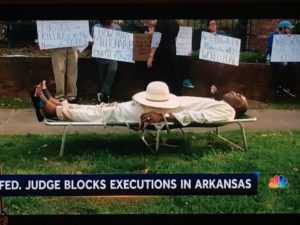A federal judge ruled April 12 that an Arkansas judge who also serves as pastor of a Baptist church can sue justices of the state Supreme Court — though not the court itself — for removing him from death penalty cases because of his religious belief that capital punishment is immoral.

Judge Wendell Griffen
Circuit Judge Wendell Griffen filed a lawsuit Oct. 5 in federal court against the Arkansas Supreme Court justices who barred him from hearing any cases relating to the death penalty or lethal injection after he joined church members at a vigil on Good Friday 2017 protesting the state’s plan to execute eight men 11 days later.
Griffen, pastor of Cooperative Baptist Fellowship-affiliated New Millennium Church in Little Rock, accused the justices of both violating his religious freedom and “discriminatory racial animus toward him as a person of African-American ancestry and racial identity.”

(Photo/Aubrey Ducker/FB)
Griffen was photographed at a prayer vigil outside the Arkansas Governor’s Mansion lying on a cot posing as a dead man. He said it was “in solidarity with Jesus, the leader of our religion who was put to death by crucifixion by the Roman Empire,” but some observers interpreted it as portraying someone strapped to a gurney for lethal injection. He was not wearing a judicial robe and did not identify himself as a judge.
In his lawsuit, Griffen said he has expressed his personal religious and moral views on social issues in his capacity as a pastor but has always conducted his religious activities outside the auspices of his judicial role.
“Judge Griffen has been open and forthright in his personal and religious life concerning his religious and moral views about the death penalty, while at the same time, demonstrating his commitment to follow the law when fulfilling his judicial duties,” the lawsuit said. “He renders to the law the things that are the law’s, and to his God the things that are God’s.”
Griffen claimed the Supreme Court took action against him in “retaliation” for his peaceful protest. He says no white member of the judiciary has received similar punishment for exercising their First Amendment rights.
The Supreme Court sought to have to case dismissed on procedural grounds, but United States District Judge James M. Moody Jr. said April 12 Griffen’s case against the individual justices can proceed. Moody said Griffen cannot sue the Supreme Court as a whole because of sovereign immunity, a legal doctrine that states the government cannot be sued without its consent.
Previous stories:
Judge disputes claims that his death penalty protest violated judicial impartiality
Pastor/judge threatened with impeachment says his critics ignore the Constitution
CBF leaders side with pastor/judge in dispute over religion, bias
